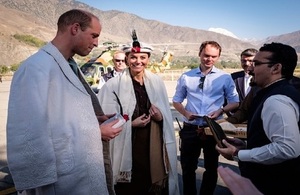Duke and Duchess of Cambridge witness the impact of climate change in northern Pakistan
The impact of climate change on fragile and remote communities was seen by Their Royal Highnesses (TRH) the Duke and Duchess of Cambridge on a visit to Pakistan’s mountainous Chitral District.

Their Royal Highnesses (TRH) the Duke and Duchess of Cambridge on a visit to Pakistan’s mountainous Chitral District.
TRH saw how communities are responding and adapting to the effects of climate change, which is a key area of interest for The Duke and Duchess at home and globally.
They first visited the remote Chiatibo Glacier in Broghil National Park to see how climate change is causing glaciers to melt, creating risks for downstream communities. They received a detailed briefing on glacial melting, climate change and its causes and implications from Pakistani hydrometeorologist and glacier expert Dr Furrukh Bashir of the Pakistan Meteorological Department.
Afterwards TRH travelled to Bumburet, home to the Kalash minority, to see the damage that flooding linked to climate change has already caused in the region, and to learn how communities are responding. They saw first-hand the extensive damage done by a 2015 Glacial Lake Outburst Flood (GLOF) and received a briefing from the community on how the lives of local people were affected. They then saw a first aid drill performed by volunteers from the local Emergency Response Team, which is supported by UK Aid, a river crossing drill performed by the regional Search and Rescue Team.
Finally, TRH met members of the Kalash and Sunni communities in the settlement of Karakal, to learn more about their distinctive culture.
Notes to Editors
Climate Change
As climate change effects are accentuated at altitude, a 1.5°C global temperature increase (the limit of what the world might realistically be able to achieve through rapid and concerted action) is likely to mean warming of c.2.2°C for northern Pakistan’s mountains. This could lead to a loss of 36% of its glaciers by 2100.
The melting of the region’s glaciers poses immediate problems for the communities living below them. Temporary glacial lakes have been forming at an increasing rate and expanding in volume since the 1990s. When these burst, in ‘Glacial Lake Outburst Flooding’ incidents (GLOFs), downstream communities are often devastated. A GLOF in Bumburet in 2000 destroyed 40% of cultivatable land, and another in 2015 washed away roads, houses and other infrastructure. Disaster preparedness training and monitoring equipment installed by NGOs meant there was enough warning of the 2015 GLOF for the community’s volunteer Emergency Response Team to evacuate those at risk. As a result, no lives were lost.
Broghil National Park
Established in 2010 with support from the WWF, Broghil National Park is a haven for indigenous and migratory fauna, especially rare Pamirian and Siberian birds. The Broghil Valley is largely treeless Alpine tundra, at around 3500m in elevation. It stretches over 310,000 acres and is sparsely populated. The settlement of Ishkarwaz, close to the Chiatibo Glacier, is home to the world’s highest polo ground, which every year hosts a celebrated yak polo tournament. The Park is in the remote and sparsely populated north-east of the Chitral District, adjacent to the Wakhan Corridor, a strip of Afghanistan which borders Pakistan to the south and Tajikistan to the north. The Hindu Raj range and the many glaciers that flow from it form the southern side of the Broghil Valley.
UK involvement
The UK Government, through DFID, is contributing to a pioneering project, called Building Disaster Resilience in Pakistan, which looks at how to provide early warning of GLOF events to downstream communities. This is now being scaled up into a programme covering vulnerable communities across northern Pakistan. £33.9m of UK aid has been provided so far.
The world’s poorest communities are often the hardest hit by the consequences of climate change – this community is a key example. The UK is committed to ensure that resilience building for local communities to make them less vulnerable to extreme weather changes is at the heart of its strategy to fight climate change with UK aid. Across Pakistan, this is one of four programmes focused on adaptation to climate change.
By 2020 this programme will:
- Help 1.5 million people prepare themselves for natural disasters including flooding and drought
- Ensure communities and towns have hazard maps and plans for when shocks to happen
- Build agricultural resilience to extreme weather changes, a pilot which will inform our work globally to respond to climate change
- Establish emergency response teams in districts at risk to manage crises
- Ensure that local communities are in close contact with local government to share information and respond together to natural disasters
In Bumburet, UK aid has supported post-flood reconstruction and disaster preparedness work, delivered by the NGO ACTED. ACTED helped to re-establish and train the village Emergency Response Team (crucial to preventing loss of life in the 2015 floods) and constructed drainage lines, roads, irrigation channels, flood protection walls, and shelters.
‘Cash for work’ schemes support Kalash households by providing a market for the handicrafts produced by female villagers, and ‘climate smart’ training helps farmers adapt their agricultural techniques to ensure food security. ACTED work closely in the area with the Aga Khan Development Network (AKDN) and Aga Khan Rural Support Programme (AKRSP). WWF also supports conservation projects locally.
For further information
For updates on the British High Commission, please follow our social media channels:
- Twitter: @UKinPakistan, @ChevPakistan, @tomdrewUK
Contact
British High Commission
Islamabad
tel. 0300 500 5306